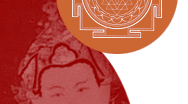

 |
 |
|
|
~ Project News and Articles: | ~
The Rudi Report 2005
The
Rudi Report 2005
In Ravindra Jyapoo’s studio at the base of the Swayambunath stupa
in Kathmandu, a miracle has been happening: Rudi is taking shape. Ravindra,
a well-known sculptor in Kathmandu, has been working with Karla Refojo
for the last four years to make the Rudi statue, and at last they're beginning
to see the results of their work The work has presented many challenges,
but both he and Karla are delighted by how it is going.
Their team of workers is continually expanding, Ravindra's son Rajendra
has recently joined the group and is managing the project with another
of our friends, Sudarshan Suwal.
On Friday, March 11, Karla wrote:
"Yesterday I got the emergency call at Ravindra's at 3 in the afternoon
that they were beginning to melt the metal and would pour it last night
so I better come quick! I didn't get home until 10 at night and it was
just totally amazing. Seems impossible that they can do anything with
the materials and lack thereof.....
They started firing him on Sivaratri…
This morning I went there for the shells to be broken and to see what
was inside. There was rain and thunder and lightning and then…out came
Rudi."
These are the first photos of Rudi's face, hand and foot after the pieces
were taken out of the molds.
When you see the working conditions in Nepal, you appreciate the skill
of Newari sculptors even more. At Ravindra's house and studio, there are
few amenities. The casting occurs outside, on a small patio behind Ravindra’s
house. Ravindra and his helpers work as Newaris have done for centuries,
without the benefit of protective gear. (In fact, Karla noted that the
workers melting and pouring the metal were wearing flip-flops!)
The first step in the casting process is to construct an oven to heat
the wax model, which has been placed into a mold. The ovens are custom
built for each project and are made of bricks and dried cow dung. They
are sized to accommodate the wax model to be placed inside. The ovens
are heated by a wood fire underneath, and the wax is melted down to make
way for the metal.
The craftsmen make the fire to melt the metal for the statue with a kerosene
burner, and the metal must be heated for several hours before it is ready
to pour. The metal is heated in small batches. They use scrap metal salvaged
from other projects (everything in Nepal is recycled)—small pieces
of brass, copper, tin, zinc, gold and silver. The hardest metal, brass,
is put in first, and the others follow, with gold being the last metal
as it is the softest.
Karla was puzzled to see small pieces of broken glass being added to the
mix, and she learned that they act as a magnet to draw out any impurities
in the metals. Those rise to the surface and are skimmed off before the
mixture is poured into the molds.
The wax statue that Ravindra and Karla made last year was too large to
be cast in one piece and so it was cut up into ten separate pieces, and
each was put into its own mold. The molds are heated and the wax melts,
leaving space inside for the metal to be poured in.
The casting of Rudi took two days because numerous batches of metal were
needed. The two legs and base pieces were done on the first day and the
rest, including the head, were done on the second..  Karla writes: “The metal cooled over night before they broke open
the molds. When they opened it, it was still hot. Rudi stayed hot for
quite a while after opening…surprise, surprise.”
Karla writes: “The metal cooled over night before they broke open
the molds. When they opened it, it was still hot. Rudi stayed hot for
quite a while after opening…surprise, surprise.”
The first step after the metal cooled was to clean and refine the surface.
The initial round of cleaning was done with electric power sanders and
small drills. The surface was also chiseled and hammered to take out any
unevenness in the casting. The surface is then sanded with increasingly
finer grades of sandpaper until the desired finish is achieved. Karla
noticed a woman hired to pound the remnant brick and plaster pieces to
pick out and salvage any small pieces of metal. They will be saved for
the next project.
In doing the finish work, Ravindra’s helpers are encountering a
first: how to create the illusion of body hair on the arms and legs (similar
to our Nityananda statue). Traditionally, Nepali statues have a smooth
finish, but Karla is looking for more realism with Rudi. She sat down
with a chisel and a group of craftsmen and some close-up photos of Nityananda
and they worked out a way to give the effect of hair.
Karla’s vision is that Rudi will be smooth only on the high points
(like the nose and belly) to give the appearance that he has been rubbed
for centuries by the hands of devotees, like an old Ganesh statue. After
the statue is completely assembled, she’ll start working on the
patina.
Swamiji went to see the statue recently, and Karla reported that he liked
the head. Swamiji said that when he looked at Rudi’s eyes, “They
looked back.”
Here’s another view of Rudi:
We hope to have the Rudi statue here this summer so that it can be installed
during the July retreat. Swamiji thinks that he belongs in the meditation
room, so we'll have all the images of our teachers in one place. Nityananda
and Rudi will be placed in the front of the meditation room, on either
side of the teaching stand.
Rudi will have a peacock canopy just like Nityananda's, and Monica O'Neal
is heading up a team of seamstresses to put it together. The canopy will
consist of 450 individual chevrons of fabric woven with pieces of peacock
feathers, and each will have an embroidered eye.
We're continuing the stone work in the main part of the shrine area so
that all the areas around Rudi will be at their best before the statue
arrives. Len Riegler, Kathy Dahlke and Tom Fabrizio continue to be the
main workers, but they've had a lot of help from other volunteers.
In both Portland and Nepal, the excitement is building. Rudi's arrival
will be a momentous occasion for everyone in our community.